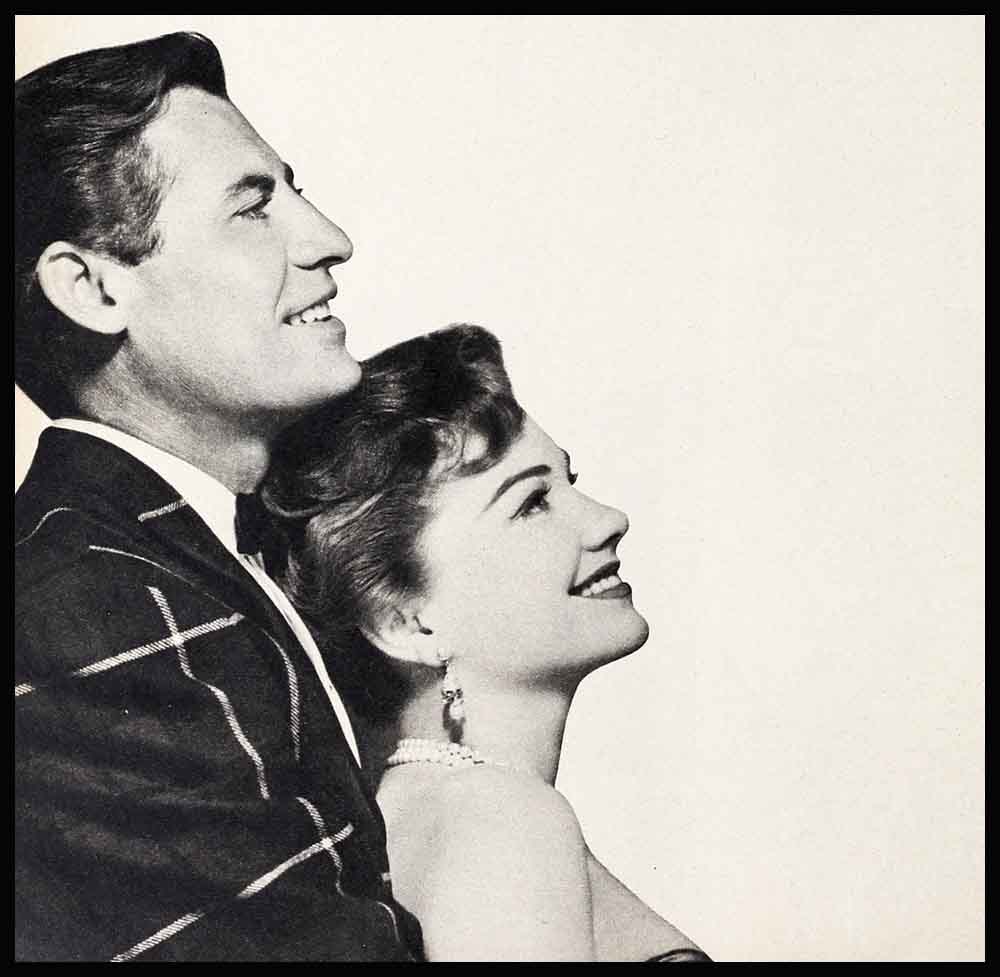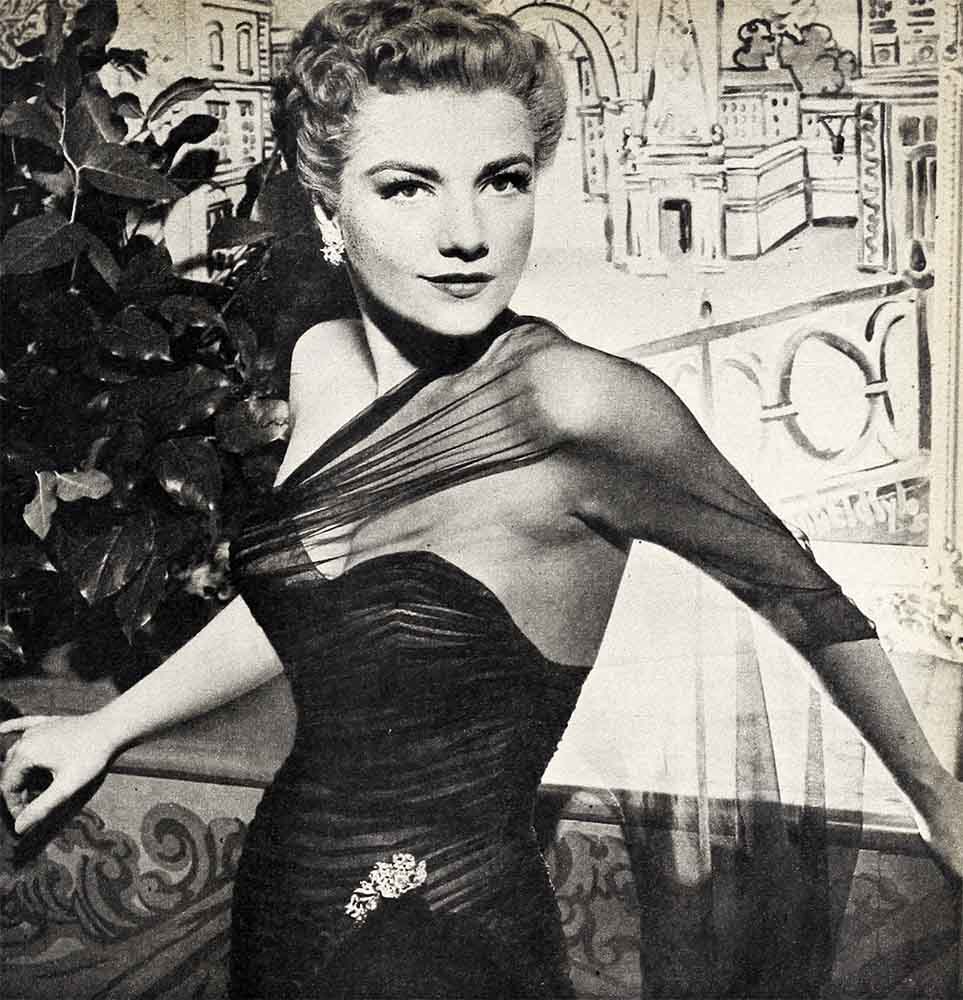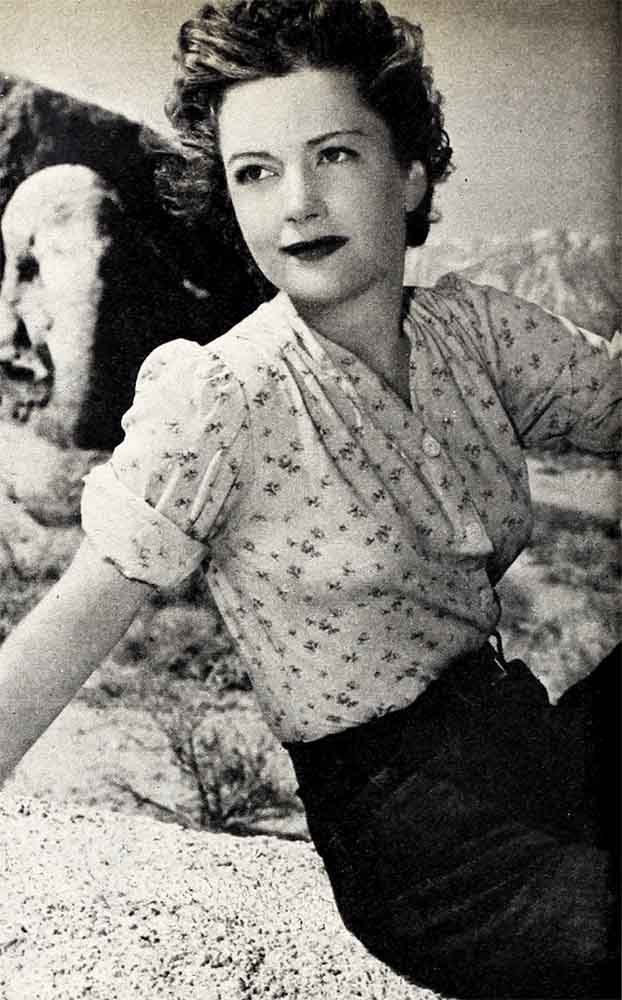
As You Were, Annie. . .
Everyone has a reason for the break-up of the Anne Baxter-John Hodiak marriage. It’s her mother. It’s her grandfather. He bores her. She embarrasses him. She’s a snob. He’s a sourpuss. She’s too ambitious. He isn’t ambitious enough. She’s an extrovert. He’s the retiring type. She loves publicity. He hates it. She’s a poet, and he’s a peasant. It all adds up to some fancy psychoanalysis. Let’s see what the truth really is.
The trouble started in the beginning of the marriage. It was no secret then that the very social Mrs. Kenneth Baxter was opposed to John, son of Anna and Walter Pogorzelliec, Ukrainian immigrants. To be fair to Anne’s mother, there was nothing too personal in her feeling against John. She was just as opposed to William Eythe, the only other man Annie dated with any frequency before she fell in love with Hodiak. Apparently, like a lot of doting mothers, Mrs. Baxter did not think any man was good enough for her only child.
But when Anne proved a chip off the old obstinate block, and according to the gossip at the time, threatened to elope with John, Mrs. Baxter accepted the inevitable. She gave them a lavish wedding in the garden of her swank estate up north in Burlingame, with Anne radiant in full bridal regalia. If John was uncomfortable, in his clothes or surroundings, he was careful to conceal his emotions. He smiled at the right moments and said the usual inane things to the curious crowd of well-heeled strangers and family friends. It was a difficult situation, but he carried it off.
And while I wasn’t there, I have a hunch that Mrs. Baxter prayed that in time the refining influence of her precious daughter would smooth out the rougher edges of her new son. But something went wrong. It was Anne who grew raucous. And the louder her laugh, the more sensational her conduct, the quieter and more irritable grew John. And he never really cottoned to her family. In fact, the first year of the marriage John was so intimidated by Anne’s mama and papa, he always referred to them as “Mr. and Mrs. Baxter.”
Just before the break, they were dining with a group at La Rue’s restaurant in Hollywood. Anne was pounding on the table, as usual, to prove a point, when, to Hodiak’s acute embarrassment, he heard the host at the table next to them order from the waiter one set of ear-muffs for each of his guests.
The rumors of trouble within the marriage started about a year ago. They were denied vehemently by Anne, who didn’t want any “I told you so’s” from her mother. But it was two years ago that I first saw the crack in what had appeared to be one of the more ideal matings of Hollywood. It was at Arlene Dahl’s annual glogg gathering at Christmas. Anne was in a corner screaming with a group of buddies. John was standing by the door holding her coat and waiting for her to leave with him. Five minutes, ten minutes, half an hour. John was still holding the coat, but getting angrier with every minute that ticked off. Then suddenly he said he was leaving. She could stay if she wanted. He took off. Anne followed ten minutes later.
I sometimes think that if John hadn’t been so conservative the marriage would have had a better chance. They had planned to buy a home after their honeymoon. Anne’s place was attractive, but too small with a man around the house and a hoped-for family. So they went looking at real estate when prices were at the peak of an inflated market.
“Ridiculous,” said Anne in reply to each swollen house tag. “Ridiculous,” echoed the thrifty actor. So they decided to live in Annie’s house and just add a couple of rooms. But the additions cost them more than buying a new house would have. And while the master bedroom is now streamlined and modern, in the beginning Hodiak was sleeping surrounded by plaster angels and heaven-knows-what feminine frippery. A non-compromiser such as John can never be happy in the role of his wife’s paying guest. It would have been cheaper, from the viewpoint of happiness, to have bought his own home.
Anne is the untidy type—clothes all over the place—caps off the tooth paste. John is very fastidious—and runs his home beautifully.
When the Hodiaks separated, a wagster quipped, “I wonder who gets custody of the cigars?” There’ve been more jokes about Baxter’s cigars than about Jane Russell’s bosom. The stogies started in the brain of her press agent, who wanted some quick publicity for his strong-minded client. Neither he nor Anne expected them to backfire. At first it was cute. Alfred Hitchcock, who was starring Anne with Montgomery Clift in “I Confess,” was supposed to have introduced her to “a small ladylike cigar.” Later, Hitchcock denied the story and said he was opposed to cigars for women—especially for a female starring in a religious film like “I Confess.” Anne followed through and said cigars were heaven to smoke. Actually, I doubt whether she went further than one puff. No one bothered to ask her husband what he thought of all this. But I have it from an old cigar band that John raved when he saw photos of his stogie-chewing bride. And I hate to think what they said in staid old Burlingame.
But Anne wanted publicity and her press agent was merely obliging. The main mission was accomplished—to get everyone talking about Baxter. You couldn’t sell her to a small-town paper—B.C.—before cigars. Now she’s on seven magazine covers. And here we are writing a story about her, aren’t we? But what’s food for the career was poison for the marriage. John had wed a young lady and now found himself stuck with a circus. Moreover he was on the outside, just watching the performance. He had no part in it.
Anne Baxter has always been one of the most ambitious of actresses. I remember when she did “Guest in the House”—she was about eighteen then, and pudgy. It was a real mean role. And all Anne talked about then was what “Of Human Bondage” had done for Bette Davis, playing a girl who was almost as nauseating.
Anne, always an excellent actress, had two strikes against her, however. She was hugely overweight and she lacked confidence in herself as a woman. Perhaps that’s why she does so much shouting, like the neglected child who is naughty, to draw attention. For instance—take Annie’s nose. I like it, but she apparently doesn’t. And when someone recently asked her if she’d had it fixed, she retorted, “D’ye think I’d have it fixed this way?” She has more self-assurance now, and even posed for cheesecake a few weeks ago. That couldn’t have happened five years back.
I sincerely believe she’ll do anything within the law to further her career. In her last picture, “The Blue Gardenia,” she consented to the most realistic seduction scene I’ve ever seen on celluloid, in the least amount of clothing. And when they were taking still photographs and she was asked, “Can we take some more of the lace off the neckline?”—she said, “Yes” without a murmur. The parting with John, by the way, occurred during this picture. And after a tough scene Anne started to cry and couldn’t stop. Hodiak, who is also very emotional behind his reserved facade, had tears in his eyes all one evening at the Zachary Scotts’ before the break-up.
Hodiak married a brunette. He didn’t bargain on a blonde. At first Anne said she dyed because she wanted to show Darryl Zanuck how she’d look for “Gentlemen Prefer Blondes.” But Darryl hadn’t even yet recovered from switching Linda Darnell to the blonde brigade in “Forever Amber,” and Baxter wound up on the outside, looking in at Marilyn Monroe. So you’d think she’d revert to her natural, pretty brownette. But not Annie. She’s sticking by her chosen color. Because above everything else she wants to look sexy, and she’s convinced she looks more so with the light yellow hair. It’s a losing fight. Monroe can do more with a twitch of her hip than Anne with a million dollars’ worth of determination.
“She’s trying too hard,” is the general feeling in Hollywood re Anne’s new sex-appeal tactics. It isn’t really her type to flaunt her figure or to be anything except conservative in her private life. She’s a good actress. I wonder why she doesn’t let it go at that. I thought she was great in “All About Eve.” And even in her plumpest period, wasn’t she terrific in “The Razor’s Edge”? It won her an Oscar.
“But when I saw myself on the screen, I nearly passed out,” she told me at the time. “I was so fat. I had to lose weight—or else.” She must have lost forty pounds on the most agonizing diet I have ever heard a doctor not recommend. For lunches she’d peck at half a teaspoon of cottage cheese. That’s all. And go to bed without a bit of dinner. She fainted all over the place and no wonder, at three hundred calories a day. And a lot of real, hard work!
Those days, in spite of her explanation, I believed she was reducing to please her husband. I know better now. She was starving to feed her ego. Anne is the type who puts on weight no matter how little she eats, so she has to watch it all the time. And if you’ve ever lived with a woman who weighs her intake, you’ll know it isn’t easy living.
Then take the business of the red sash. Anne told an interviewer that her famous architect-grandfather, Frank Lloyd Wright, wore only a red sash on his wedding night! This can’t be the same girl who used to blush when you asked her if the romance with Bill Eythe was serious. She and John had a big battle over that sash. And I don’t believe her mother liked it either. I’m told, though, that Mr. Wright roared—with laughter—when he read the syndicated tidbit.
But I don’t think Anne needs this kind of publicity. Some people have to be sensational to be noticed by the casting office. But not Anne. She can be dignified, as she was when John first married her, and still be in demand for good roles.
Her friends cover up for her, explaining she was a bit scared when she left Twentieth Century-Fox after eleven years to freelance. But the change started before she parted with the studio, and now that she’s parted from her husband, maybe she’ll cut out the high jinks. Because the proof of the pudding is her pictures. The career is okay—she made $150,000 within six months of freelancing. And maybe she will realize her noisy behavior will frighten off the kind of man she likes best, the quiet kind. Although she says she’s pleased about all her new publicity.
They say that John bored Anne in the last year of their marriage. He’s courteous, but I’ve seen him pout in public. Which sounds as if it happened at home. And Anne is an avid reader. If John possesses a library I haven’t heard of it. She likes to visit art exhibits. I have a hunch John calls that sort of thing arty.
Then there’s the big difference in their professional status. Anne is a big star now. John was on the same level with her when they met during “Sunday Dinner for a Soldier.” But in the past few years her career has gone up; his has lessened in importance. It’s embarrassing in this or any other town when the wife is more important than the husband. There’s usually friction when the woman is the biggest bread and cake winner.
When good pictures weren’t offered, John took a play in New York. And even though the rumors were started, I didn’t believe them because Anne was so excited about flying east for his first night. If it was an act, it was the greatest performance of her life. But she was detained on a picture, and arrived in New York in time for the closing of the play.
I’m sorry for their daughter. They were so happy when Anne found she was pregnant. Katrina is almost two years old now. And very few people know that her mother was very ill after her birth, with phlebitis, an illness which is sometimes fatal.
It’s hard for me to believe Anne and John have broken up. I can still remember when she was making “Yellow Sky.” John was in London and she’d leave the set after every take to find out what in heck had happened to the call she had put through to him. And I remember her shining face after she finally talked to him.
And I can still see John, after the break-up, in the bar of the Polo Lounge, tossing off a drink with some French gals who thought they had an easy date. But John left them. He was weeping when he hurried out of the smoke-filled bar.
To sum up, everyone in Hollywood feels the same about the break-up of the Anne Baxter-John Hodiak marriage. They’re both nice people. It’s just too darn bad that it didn’t work out.
THE END
It is a quote. PHOTOPLAY MAGAZINE APRIL 1953






